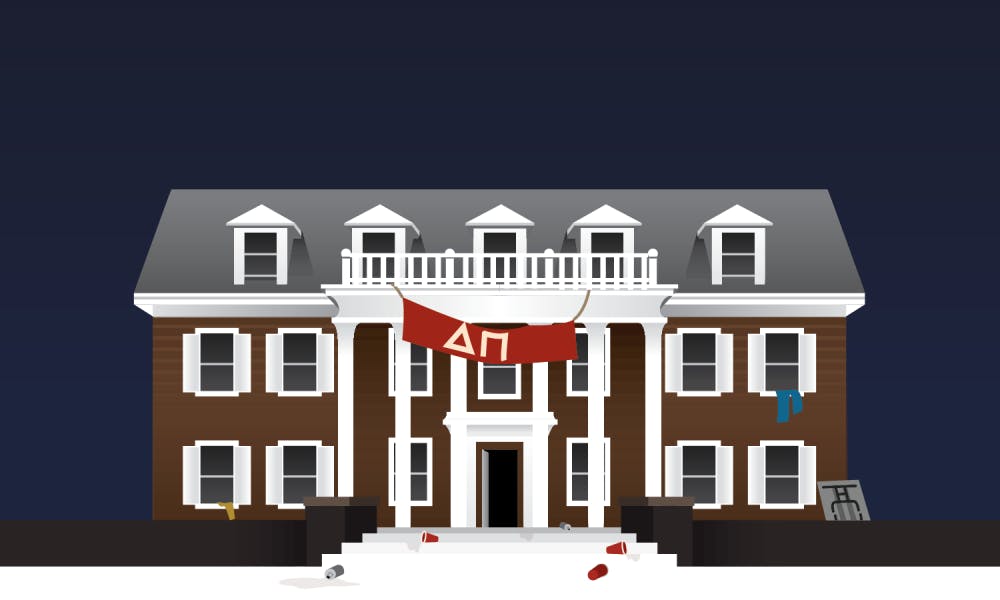University crackdowns on Greek life and single-gender clubs started in the 1960s, but have intensified in recent years. Penn recently joined the growing list of institutions introducing new rules for social life on campus.
One would the most dramatic crackdowns in recent would memory could occur soon if Harvard University President Drew Faust approves a proposal to ban membership in social organizations.
Penn has not proposed strict bans on organizations like Harvard, but the enforcement of recommendations made by the Task Force on a Safe Responsible Campus Community has increased limitations on unregistered student social events.
Administrators began rolling out heightened policy efforts this semester to follow up on recommendations made by the task force, which was created following campus uproar over a sexually suggestive email sent by off-campus group OZ in 2016.
Students have reacted negatively to several of the new initiatives, particularly those that have caused an uptick in social event closures, though Penn's actions are not necessarily new among institutions of higher education.
Similar campus crackdowns have been part of higher education for nearly 60 years. Between 2014 and 2015, there was a sudden rise in crackdowns on Greek life, incited by nationally-publicized student deaths and injuries.

In 2014, the University of Virginia suspended all fraternities after a report on sexual assault was highlighted in "A Rape on Campus," an infamous article in Rolling Stone. Various parts of the article were later found to have been fabricated and Rolling Stone later retracted the piece. In 2015, the UVA administration lifted the suspension on fraternities.
From 2014 to 2015, West Virginia University, Clemson University and Texas Tech University all suspended campus Greek chapters following the deaths of students as a result of Greek life activities.
Vice President for Public Safety Maureen Rush, who was a tri-chair of the task force, said getting rid of Greek life at Penn was “never the intention” of the task force.
In the original statement announcing the formation of a task force last November, Penn President Amy Gutmann and former Provost Vincent Price referenced the "inappropriate" actions of the OZ email and condemned the “negative influence of unaffiliated and unsupervised groups.”
Despite this email, Rush said in an interview with The Daily Pennsylvanian that mission of the task force was intended to be broader than just a response to OZ.
The email was “unacceptable and sexist,” she said, but the task force had actually formed in response to “several students putting themselves in very grave danger, including last year at [New Student Orientation].”
Apart from crises like student deaths and incidents of sexual violence, universities have also chosen to ban Greek life and other single-gender organizations for inclusivity purposes.
Both Williams College in Massachusetts and Middlebury College in Vermont were among the first institutions to end single-gender Greek organizations.
Williams abolished fraternities in the early 1960s, when it was still an all-male campus. Jim Reische, the chief communications officer for Williams, said in an emailed statement to the DP that students “can find (or create) their best community,” and “so far that hasn’t led to much expressed interest in Greek life.”
Middlebury required all fraternities to become co-ed or disband in 1990.
“The administration at the time concluded that all-male fraternities played too large a role in student social life and that more students should have access to social organizations that could help to shape the culture of the campus,” Director of Media Relations at Middlebury Sarah Ray said in an email.
Most recently, Harvard's administration is still considering a plan to phase out Greek organizations and final clubs by May 2022.
“Although the fraternities, sororities, and final clubs are not formally recognized by the College, they play an unmistakable and growing role in student life, in many cases enacting forms of privilege and exclusion at odds with our deepest values,” Drew Faust wrote in an email in May 2016, according to The Harvard Crimson.
She added, “The College cannot ignore these organizations if it is to advance our shared commitment to broadening opportunity and making Harvard a campus for all of its students.”
Vice Provost for University Life Valarie Swain-Cade McCoullum, another former tri-chair of the task force, said in a written statement to the DP that she has “been focused on our work at Penn,” and did not have any information or context in relationship to Harvard.
Rush added that Harvard’s announcement was not a driving force in the decision to create the task force. She maintained that the task force’s primary purpose is the “life safety of all students,” not to end Greek life on Penn’s campus.
“Our goal is not to make students have a horrible time and no social life,” Rush said. “You can have nice, fun parties, but plan it out. Know the number of people that are coming.”



